Architecture
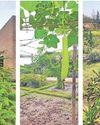
Journal of Landscape Architecture
PLANTING IN URBAN AREAS NOTES
In urban landscapes, while balancing aesthetic design with their ecological functions, the understanding of plants in respect of their ecozones*, microhabitats, and species plays a crucial role. Native plants offer ecological benefits but face challenges in urban environments. There are some pragmatic considerations in this regard.
3 min |
LA 78
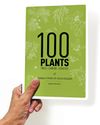
Journal of Landscape Architecture
PLANTS IN ECOLOGY AND DESIGN
'100 Plants' offers insight into Delhi's ecology, guiding landscape architects and gardeners to cultivate sustainable, bio-diverse urban landscapes. It is an essential resource for all plant enthusiasts.
3 min |
LA 78
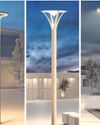
Journal of Landscape Architecture
LANDSCAPE LUMINAIRES CAPTURING THE ESSENCE OF LANDSCAPES
Landscape luminaires blend with architecture, enhancing safety, security, accentuation, and aesthetics while minimizing light pollution and promoting sustainability for a captivating outdoor experience.
2 min |
LA 78
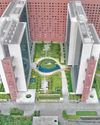
Journal of Landscape Architecture
SURAT DIAMOND BOURSE
The landscape design of the corporate-commercial centre, inspired by the five elements of nature and Vastu principles, attempts to create a unique sense of place. It combines design with public art, encouraging a harmonious environment for business and leisure.
2 min |
LA 78
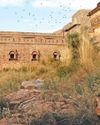
Journal of Landscape Architecture
SIX SENSES FORT BARWARA RAJASTHAN
In the transformation of a historic 14th century fort-an erstwhile home of a Rajasthan royal family-into a luxury resort, native plants and indigenous materials play a pivotal role, redefining luxury with ecological sensitivity.
4 min |
LA 78
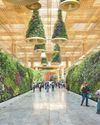
Journal of Landscape Architecture
'A TERMINAL IN A GARDEN' PUTTING NATURE AND BIODIVERSITY AT THE HEART OF THE PASSENGER EXPERIENCE
The design of Terminal 2 (T2) at Kempegowda International Airport in Bengaluru is an attempt to provide a sensory and biophilic experience for passengers.
4 min |
LA 78
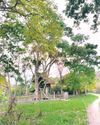
Journal of Landscape Architecture
IDEAS OF 'SCENERY' AND 'LANDSCAPE' LINKING GEOGRAPHY WITH LANDSCAPE ARCHITECTURE
The term ‘landscape’ while encompassing natural and human elements, is understood differently among disciplines. Geographers, another set of experts working closely with nature, provide crucial ecological data, aiding landscape architects in creating sustainable designs.
3 min |
LA 78
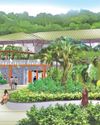
Journal of Landscape Architecture
THRISSUR ZOOLOGICAL PARK KERALA
The relocated Zoo aims to showcase rich Western Ghats ecosystems, support nature conservation, and provide immersive visitor experience. The development integrates ecological restoration, architecture and landscape while improving livelihood opportunities of the local community.
2 min |
LA 78

Journal of Landscape Architecture
ECOLOGY AND LOCAL CULTURE
With a working panel of scientists and experts from different fields of plant and animal ecology, the Nature Conservation Foundation is a Mysore-based NGO, engaged in exploring, understanding, and conserving the natural world through research and responsible engagement with society.
4 min |
LA 78
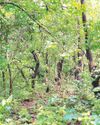
Journal of Landscape Architecture
BEAUTY FOLLOWS COMPLEXITY
Designers must heed Sullivan's \"form follows function\" to avoid beauty over function. Following nature in landscape design enhances ecological productivity while promoting sustainability with principles of use of native species, biodiversity, and conservation of natural resources.
5 min |
LA 78

Journal of Landscape Architecture
THE YAMUNA GENTLY WEEPS TONIGHT
MANOJ KUMAR MISRA: 1954-2023
3 min |
LA 74

Journal of Landscape Architecture
DECODING KOLKATA'S DURGA PUJA
A compilation of the study of the Doctrate thesis on the subject, captures the essence of the unique annual festival, while exploring the idea of it being a great example of a participatory community design on an urban scale, with a high democratic and inclusive spirit
3 min |
LA 74

Journal of Landscape Architecture
TOWARDS an INDI(A)GENE: RE-IMAGINING INDIA'S DESIGN PHILOSOPHY
The article visits some of the less documented traditional practices of nature conservation and eco-friendly lifestyles, belonging to different rural geographies in the Indian subcontinent. It also points out the possibility of adapting these practices within the current urban scenario of India to achieve climate resilience
10 min |
LA 74

Journal of Landscape Architecture
UNRAVELLING the ENIGMA
A well researched book brings to light new knowledge about Mughal Emperor Humayun, his travels, imperial life, achievements in administration and governance and his significant role in diverse creative fields related to nature, space and culture and his larger vision. The work plays an important role in redefining the Emperor’s place in the history of Mughals. Rabindra J. Vasavada reviews the scholarly work
5 min |
LA 74

Journal of Landscape Architecture
HALF A CENTURY OF GRATITUDE
Based in New Delhi, Suneet Mohindru established his landscape consultancy practice Oracles in 1997. With deep interest and commitment to academics, he has been associated with various architecture, landscape and urban design programs in the country, as educator and at times as a mentor. Suneet shares his life journey, inspirations and his views about landscape architecture – the subject, discipline and profession
10+ min |
LA 74

Journal of Landscape Architecture
COURT FORT: AN URBAN FARMING STUDIO
Court Fort is a studio space for Urban Khetti, a small-scale experience center for people to understand different concepts of biodiversity, natural farming practices, pond ecosystem, local and seasonal crops, and their impact on soil and the environment
2 min |
LA 74

Journal of Landscape Architecture
CORPORATE HOUSE: B SAFAL
The project is an attempt to redefine work space landscape design. It is conceptualized around the monolithic building of the ‘B Safal House’
1 min |
LA 74

Journal of Landscape Architecture
PROFESSOR SHONKU PARK
In the midst of redefining public parks in today’s era and a city born of culture, the design of the thematic Professor Shonku Park is an attempt to bring to life one of the most affectionate science fiction creations of Satyajit Ray, the famous director of Bengal Cinema
2 min |
LA 74

Journal of Landscape Architecture
A CITY AND ITS GARDENS: AUROVILLE, TAMIL NADU
“Auroville will be the place of an unending education, of constant progress, and a youth that never ages”. — The Mother
4 min |
LA 74

Journal of Landscape Architecture
VIEW FROM WITHIN WIDER, DEEPER
India’s population is all set to reach the world’s highest in another few months. Cities are getting denser with each passing day and with an expanding urban envelope
4 min |
LA 74

Journal of Landscape Architecture
B.V. DOSHI A EULOGY 1927-2023
He left us too early - he was young. Everyone has a story about him.
4 min |
LA 73

Journal of Landscape Architecture
DESIGNING URBAN YARNS
Urban Design may not overpower but may weave into a landscape as seen in Idea Design's Crafts Village in Kovalam in generating a composite pattern by landscape' and in Recyclebin's model eco corridor in Athirapally by extending a string with small Urban beads. In Kozhikode Deearth Architects' Freedom Square stage is an Urban 'Bobbin' of Historical and Cultural threads. Other projects bring life and vibrance to voids.
10+ min |
LA 73

Journal of Landscape Architecture
DESIGNING URBAN OUTSIDE
For many people Street is the city, or City is the street. 'Urban Design begins where the building plot ends'. Pradeep Sachdeva retextures the entire floor and designs new edges in Chandni Chowk of old Delhi to empower pedestrians over the vehicles reducing an overload. Prasanna Desai in Pune, StudioPod in Mumbai and Studio Code in Delhi introduce robust street furniture and lighting even with soft landscapes and signage to make a street a destination by creating spaces of pause next to the parallel lines of movement neatly categorised, dedicating them to pedestrians and vehicles of diverse speeds by different paving textures.
10+ min |
LA 73

Journal of Landscape Architecture
DESIGNING URBAN INSERTION
The insertion of the large parisar around Kashi Vishwanath Dham by displacing old fabric creates a new identity which however seeks to mitigate the necessarily produced form-al’ disruption by attempting to camouflage the alienation itself as integration and primarily through representation. Whereas, the formal and spatial insertions in Patna Riverfront Development provide additional support to current human activities and the identities of the series of interventions are acquired not by any representational scheme but primarily by their functional role, thus making the public domain more amenable to ritualistic celebrations at an individual level or to a large mass of people.
10 min |
LA 73

Journal of Landscape Architecture
DESIGNING URBAN INSIDE
Minor identity of the circulation spaces in the building may be turned around by metaphorically conceptualising them as public streets. In the showcased projects, those public elements break out of that metaphorical state to become real in themselves and start affecting the overall organisation in their favour. Either through independent production of the public realm in Correa's Salt Lake City Centre in Kolkata or by an independent representation of a formal complexity in Somaya's Indore campus, and for Hundredhands and Architecture Red, where the urban designers are able to generate a substantial and dominant spatial realm, where public and private places remain almost seamlessly integrated. Studio Lotus converts a gated private part of the city into a public space by partial transformation and brings the city directly into the site.
9 min |
